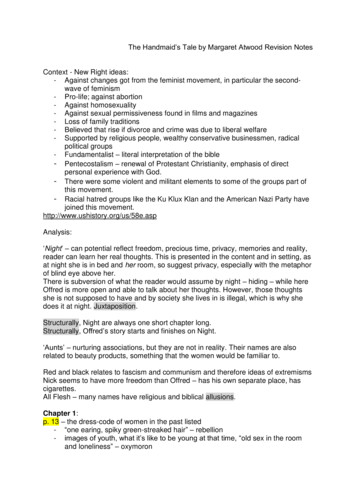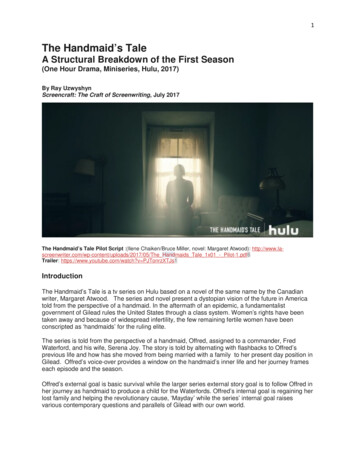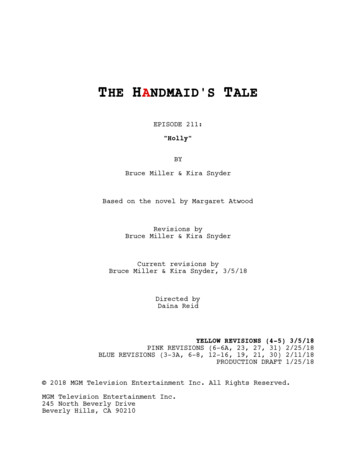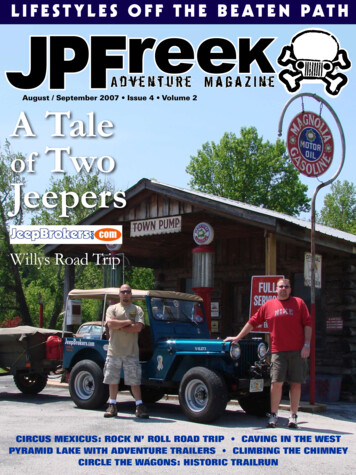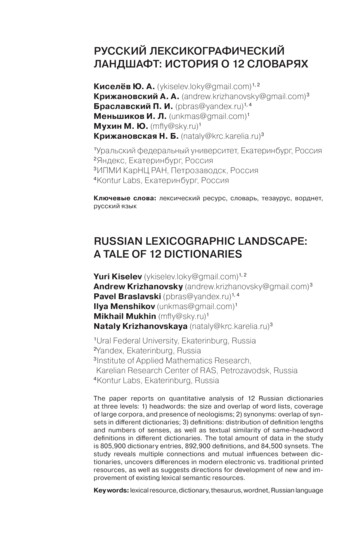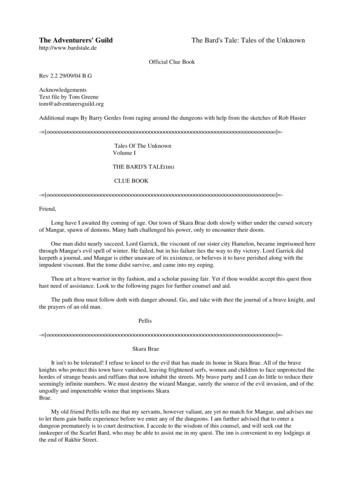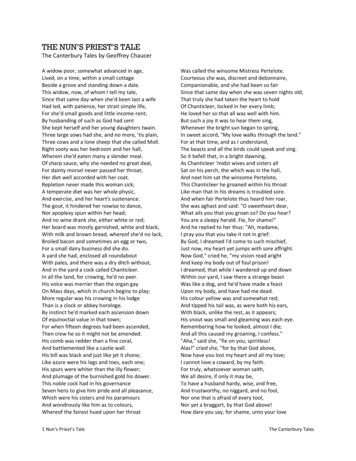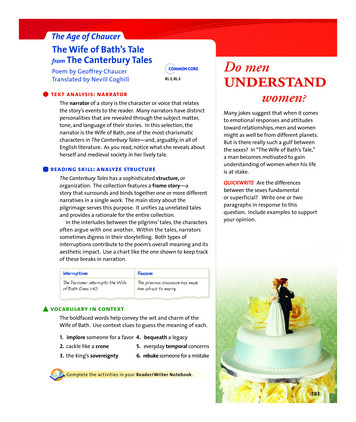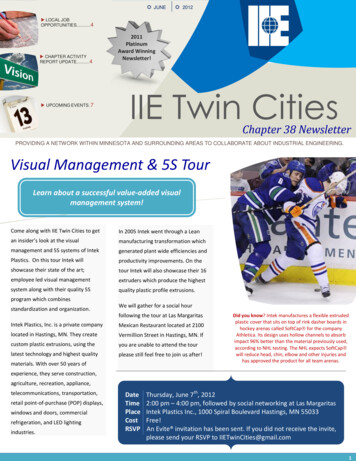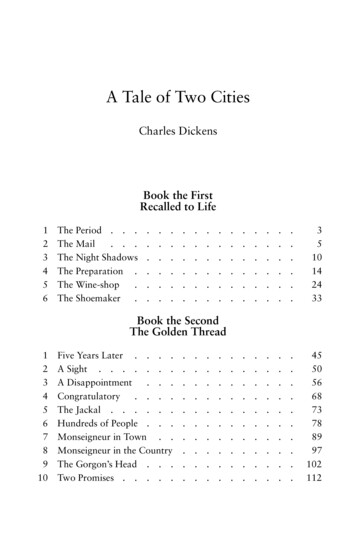
Transcription
A Tale of Two CitiesCharles DickensBook the FirstRecalled to Life123456The Period . . .The Mail. . .The Night ShadowsThe Preparation .The Wine-shop.The Shoemaker .3510142433.4550566873788997102112Book the SecondThe Golden Thread12345678910Five Years Later . . . .A Sight . . . . . . .A Disappointment. . .Congratulatory. . . .The Jackal . . . . . .Hundreds of People . . .Monseigneur in Town . .Monseigneur in the CountryThe Gorgon’s Head . . .Two Promises . . . . .
1112131415161718192021222324A Companion Picture . . .The Fellow of Delicacy . . .The Fellow of No Delicacy.The Honest Tradesman. .Knitting . . . . . . . .Still Knitting . . . . . .One Night . . . . . . .Nine Days . . . . . . .An Opinion. . . . . .A Plea. . . . . . . .Echoing Footsteps. . . .The Sea Still Rises. . . .Fire Rises. . . . . . .Drawn to the Loadstone 5225231235240245251256267278291295302313324Book the ThirdThe Track of a Storm123456789101112131415In Secret. . . . . . .The Grindstone . . . . .The Shadow. . . . . .Calm in Storm. . . . .The Wood-Sawyer. . . .Triumph. . . . . . .A Knock at the Door. . .A Hand at Cards . . . . .The Game Made . . . . .The Substance of the ShadowDusk . . . . . . . . .Darkness. . . . . . .Fifty-two. . . . . . .The Knitting Done . . . .The Footsteps Die Out For Ever.
Book the FirstRecalled to Life
A TALEOFTWO CITIESChapter 1The PeriodIt was the best of times, it was the worst of times, it was the age ofwisdom, it was the age of foolishness, it was the epoch of belief, it wasthe epoch of incredulity, it was the season of Light, it was the season ofDarkness, it was the spring of hope, it was the winter of despair, we hadeverything before us, we had nothing before us, we were all going directto Heaven, we were all going direct the other way—in short, the periodwas so far like the present period, that some of its noisiest authoritiesinsisted on its being received, for good or for evil, in the superlativedegree of comparison only.There were a king with a large jaw and a queen with a plain face, onthe throne of England; there were a king with a large jaw and a queenwith a fair face, on the throne of France. In both countries it was clearerthan crystal to the lords of the State preserves of loaves and fishes, thatthings in general were settled for ever.It was the year of Our Lord one thousand seven hundred andseventy-five. Spiritual revelations were conceded to England at thatfavoured period, as at this. Mrs. Southcott had recently attained herfive-and-twentieth blessed birthday, of whom a prophetic private inthe Life Guards had heralded the sublime appearance by announcingthat arrangements were made for the swallowing up of London andWestminster. Even the Cock-lane ghost had been laid only a rounddozen of years, after rapping out its messages, as the spirits of this veryyear last past (supernaturally deficient in originality) rapped out theirs.Mere messages in the earthly order of events had lately come to the English Crown and People, from a congress of British subjects in America:which, strange to relate, have proved more important to the human racethan any communications yet received through any of the chickens ofthe Cock-lane brood.France, less favoured on the whole as to matters spiritual than hersister of the shield and trident, rolled with exceeding smoothness downhill, making paper money and spending it. Under the guidance of herChristian pastors, she entertained herself, besides, with such humaneachievements as sentencing a youth to have his hands cut off, his tonguetorn out with pincers, and his body burned alive, because he had notkneeled down in the rain to do honour to a dirty procession of monks4
A TALEOFTWO CITIESwhich passed within his view, at a distance of some fifty or sixty yards.It is likely enough that, rooted in the woods of France and Norway,there were growing trees, when that sufferer was put to death, alreadymarked by the Woodman, Fate, to come down and be sawn into boards,to make a certain movable framework with a sack and a knife in it,terrible in history. It is likely enough that in the rough outhouses ofsome tillers of the heavy lands adjacent to Paris, there were shelteredfrom the weather that very day, rude carts, bespattered with rustic mire,snuffed about by pigs, and roosted in by poultry, which the Farmer,Death, had already set apart to be his tumbrils of the Revolution. Butthat Woodman and that Farmer, though they work unceasingly, worksilently, and no one heard them as they went about with muffled tread:the rather, forasmuch as to entertain any suspicion that they were awake,was to be atheistical and traitorous.In England, there was scarcely an amount of order and protection tojustify much national boasting. Daring burglaries by armed men, andhighway robberies, took place in the capital itself every night; familieswere publicly cautioned not to go out of town without removing theirfurniture to upholsterers’ warehouses for security; the highwayman inthe dark was a City tradesman in the light, and, being recognised andchallenged by his fellow-tradesman whom he stopped in his character of“the Captain,” gallantly shot him through the head and rode away; themall was waylaid by seven robbers, and the guard shot three dead, andthen got shot dead himself by the other four, “in consequence of the failure of his ammunition:” after which the mall was robbed in peace; thatmagnificent potentate, the Lord Mayor of London, was made to standand deliver on Turnham Green, by one highwayman, who despoiled theillustrious creature in sight of all his retinue; prisoners in London gaolsfought battles with their turnkeys, and the majesty of the law fired blunderbusses in among them, loaded with rounds of shot and ball; thievessnipped off diamond crosses from the necks of noble lords at Courtdrawing-rooms; musketeers went into St. Giles’s, to search for contraband goods, and the mob fired on the musketeers, and the musketeersfired on the mob, and nobody thought any of these occurrences muchout of the common way. In the midst of them, the hangman, ever busyand ever worse than useless, was in constant requisition; now, stringingup long rows of miscellaneous criminals; now, hanging a housebreakeron Saturday who had been taken on Tuesday; now, burning people inthe hand at Newgate by the dozen, and now burning pamphlets at the5
A TALEOFTWO CITIESdoor of Westminster Hall; to-day, taking the life of an atrocious murderer, and to-morrow of a wretched pilferer who had robbed a farmer’sboy of sixpence.All these things, and a thousand like them, came to pass in andclose upon the dear old year one thousand seven hundred and seventyfive. Environed by them, while the Woodman and the Farmer workedunheeded, those two of the large jaws, and those other two of the plainand the fair faces, trod with stir enough, and carried their divine rightswith a high hand. Thus did the year one thousand seven hundred andseventy-five conduct their Greatnesses, and myriads of small creatures—the creatures of this chronicle among the rest—along the roads that laybefore them.Chapter 2The MailIt was the Dover road that lay, on a Friday night late in November,before the first of the persons with whom this history has business. TheDover road lay, as to him, beyond the Dover mail, as it lumbered upShooter’s Hill. He walked up hill in the mire by the side of the mail, asthe rest of the passengers did; not because they had the least relish forwalking exercise, under the circumstances, but because the hill, and theharness, and the mud, and the mail, were all so heavy, that the horseshad three times already come to a stop, besides once drawing the coachacross the road, with the mutinous intent of taking it back to Blackheath.Reins and whip and coachman and guard, however, in combination,had read that article of war which forbade a purpose otherwise stronglyin favour of the argument, that some brute animals are endued withReason; and the team had capitulated and returned to their duty.With drooping heads and tremulous tails, they mashed their waythrough the thick mud, floundering and stumbling between whiles, asif they were falling to pieces at the larger joints. As often as the driverrested them and brought them to a stand, with a wary “Wo-ho! so-hothen!” the near leader violently shook his head and everything upon it—like an unusually emphatic horse, denying that the coach could be gotup the hill. Whenever the leader made this rattle, the passenger started,as a nervous passenger might, and was disturbed in mind.6
A TALEOFTWO CITIESThere was a steaming mist in all the hollows, and it had roamed inits forlornness up the hill, like an evil spirit, seeking rest and findingnone. A clammy and intensely cold mist, it made its slow way throughthe air in ripples that visibly followed and overspread one another, asthe waves of an unwholesome sea might do. It was dense enough toshut out everything from the light of the coach-lamps but these its ownworkings, and a few yards of road; and the reek of the labouring horsessteamed into it, as if they had made it all.Two other passengers, besides the one, were plodding up the hill bythe side of the mail. All three were wrapped to the cheekbones and overthe ears, and wore jack-boots. Not one of the three could have said,from anything he saw, what either of the other two was like; and eachwas hidden under almost as many wrappers from the eyes of the mind,as from the eyes of the body, of his two companions. In those days, travellers were very shy of being confidential on a short notice, for anybodyon the road might be a robber or in league with robbers. As to the latter, when every posting-house and ale-house could produce somebodyin “the Captain’s” pay, ranging from the landlord to the lowest stablenon-descript, it was the likeliest thing upon the cards. So the guard ofthe Dover mail thought to himself, that Friday night in November, onethousand seven hundred and seventy-five, lumbering up Shooter’s Hill,as he stood on his own particular perch behind the mail, beating his feet,and keeping an eye and a hand on the arm-chest before him, where aloaded blunderbuss lay at the top of six or eight loaded horse-pistols,deposited on a substratum of cutlass.The Dover mail was in its usual genial position that the guard suspected the passengers, the passengers suspected one another and theguard, they all suspected everybody else, and the coachman was sureof nothing but the horses; as to which cattle he could with a clear conscience have taken his oath on the two Testaments that they were not fitfor the journey.“Wo-ho!” said the coachman. “So, then! One more pull and you’reat the top and be damned to you, for I have had trouble enough to getyou to it!—Joe!”“Halloa!” the guard replied.“What o’clock do you make it, Joe?”“Ten minutes, good, past eleven.”“My blood!” ejaculated the vexed coachman, “and not atop ofShooter’s yet! Tst! Yah! Get on with you!”7
A TALEOFTWO CITIESThe emphatic horse, cut short by the whip in a most decided negative, made a decided scramble for it, and the three other horses followedsuit. Once more, the Dover mail struggled on, with the jack-boots ofits passengers squashing along by its side. They had stopped when thecoach stopped, and they kept close company with it. If any one of thethree had had the hardihood to propose to another to walk on a littleahead into the mist and darkness, he would have put himself in a fairway of getting shot instantly as a highwayman.The last burst carried the mail to the summit of the hill. The horsesstopped to breathe again, and the guard got down to skid the wheel forthe descent, and open the coach-door to let the passengers in.“Tst! Joe!” cried the coachman in a warning voice, looking downfrom his box.“What do you say, Tom?”They both listened.“I say a horse at a canter coming up, Joe.”“I say a horse at a gallop, Tom,” returned the guard, leaving hishold of the door, and mounting nimbly to his place. “Gentlemen! In thekings name, all of you!”With this hurried adjuration, he cocked his blunderbuss, and stoodon the offensive.The passenger booked by this history, was on the coach-step, getting in; the two other passengers were close behind him, and about tofollow. He remained on the step, half in the coach and half out of;they re-mained in the road below him. They all looked from the coachman to the guard, and from the guard to the coachman, and listened.The coachman looked back and the guard looked back, and even theemphatic leader pricked up his ears and looked back, without contradicting.The stillness consequent on the cessation of the rumbling and labouring of the coach, added to the stillness of the night, made it very quietindeed. The panting of the horses communicated a tremulous motionto the coach, as if it were in a state of agitation. The hearts of the passengers beat loud enough perhaps to be heard; but at any rate, the quietpause was audibly expressive of people out of breath, and holding thebreath, and having the pulses quickened by expectation.The sound of a horse at a gallop came fast and furiously up the hill.“So-ho!” the guard sang out, as loud as he could roar. “Yo there!Stand! I shall fire!”8
A TALEOFTWO CITIESThe pace was suddenly checked, and, with much splashing and floundering, a man’s voice called from the mist, “Is that the Dover mail?”“Never you mind what it is!” the guard retorted. “What are you?”“Is that the Dover mail?”“Why do you want to know?”“I want a passenger, if it is.”“What passenger?”“Mr. Jarvis Lorry.”Our booked passenger showed in a moment that it was his name.The guard, the coachman, and the two other passengers eyed him distrustfully.“Keep where you are,” the guard called to the voice in the mist,“because, if I should make a mistake, it could never be set right in yourlifetime. Gentleman of the name of Lorry answer straight.”“What is the matter?” asked the passenger, then, with mildly quavering speech. “Who wants me? Is it Jerry?”(“I don’t like Jerry’s voice, if it is Jerry,” growled the guard to himself.“He’s hoarser than suits me, is Jerry.”)“Yes, Mr. Lorry.”“What is the matter?”“A despatch sent after you from over yonder. T. and Co.”“I know this messenger, guard,” said Mr. Lorry, getting down intothe road—assisted from behind more swiftly than politely by the othertwo passengers, who immediately scrambled into the coach, shut thedoor, and pulled up the window. “He may come close; there’s nothingwrong.”“I hope there ain’t, but I can’t make so ’Nation sure of that,” saidthe guard, in gruff soliloquy. “Hallo you!”“Well! And hallo you!” said Jerry, more hoarsely than before.“Come on at a footpace! d’ye mind me? And if you’ve got holstersto that saddle o’ yourn, don’t let me see your hand go nigh ’em. For I’ma devil at a quick mistake, and when I make one it takes the form ofLead. So now let’s look at you.”The figures of a horse and rider came slowly through the eddyingmist, and came to the side of the mail, where the passenger stood. Therider stooped, and, casting up his eyes at the guard, handed the passenger a small folded paper. The rider’s horse was blown, and both horseand rider were covered with mud, from the hoofs of the horse to the hatof the man.9
A TALEOFTWO CITIES“Guard!” said the passenger, in a tone of quiet business confidence.The watchful guard, with his right hand at the stock of his raisedblunderbuss, his left at the barrel, and his eye on the horseman, answered curtly, “Sir.”“There is nothing to apprehend. I belong to Tellson’s Bank. Youmust know Tellson’s Bank in London. I am going to Paris on business.A crown to drink. I may read this?”“If so be as you’re quick, sir.”He opened it in the light of the coach-lamp on that side, and read—first to himself and then aloud: “ ‘Wait at Dover for Mam’selle.’ It’s notlong, you see, guard. Jerry, say that my answer was, recalled to life.”Jerry started in his saddle. “That’s a Blazing strange answer, too,”said he, at his hoarsest.“Take that message back, and they will know that I received this, aswell as if I wrote. Make the best of your way. Good night.”With those words the passenger opened the coach-door and got in;not at all assisted by his fellow-passengers, who had expeditiously secreted their watches and purses in their boots, and were now making ageneral pretence of being asleep. With no more definite purpose than toescape the hazard of originating any other kind of action.The coach lumbered on again, with heavier wreaths of mist closinground it as it began the descent. The guard soon replaced his blunderbuss in his arm-chest, and, having looked to the rest of its contents,and having looked to the supplementary pistols that he wore in his belt,looked to a smaller chest beneath his seat, in which there were a fewsmith’s tools, a couple of torches, and a tinder-box. For he was furnished with that completeness that if the coach-lamps had been blownand stormed out, which did occasionally happen, he had only to shuthimself up inside, keep the flint and steel sparks well off the straw, andget a light with tolerable safety and ease (if he were lucky) in five minutes.“Tom!” softly over the coach roof.“Hallo, Joe.”“Did you hear the message?”“I did, Joe.”“What did you make of it, Tom?”“Nothing at all, Joe.”“That’s a coincidence, too,” the guard mused, “for I made the sameof it myself.”10
A TALEOFTWO CITIESJerry, left alone in the mist and darkness, dismounted meanwhile,not only to ease his spent horse, but to wipe the mud from his face, andshake the wet out of his hat-brim, which might be capable of holdingabout half a gallon. After standing with the bridle over his heavilysplashed arm, until the wheels of the mail were no longer within hearingand the night was quite still again, he turned to walk down the hill.“After that there gallop from Temple Bar, old lady, I won’t trust yourfore-legs till I get you on the level,” said this hoarse messenger, glancingat his mare. “ ‘Recalled to life.’ That’s a Blazing strange message. Muchof that wouldn’t do for you, Jerry! I say, Jerry! You’d be in a Blazingbad way, if recalling to life was to come into fashion, Jerry!”Chapter 3The Night ShadowsA wonderful fact to reflect upon, that every human creature is constituted to be that profound secret and mystery to every other. A solemnconsideration, when I enter a great city by night, that every one of thosedarkly clustered houses encloses its own secret; that every room in everyone of them encloses its own secret; that every beating heart in the hundreds of thousands of breasts there, is, in some of its imaginings, a secretto the heart nearest it! Something of the awfulness, even of Death itself,is referable to this. No more can I turn the leaves of this dear book thatI loved, and vainly hope in time to read it all. No more can I look intothe depths of this unfathomable water, wherein, as momentary lightsglanced into it, I have had glimpses of buried treasure and other thingssubmerged. It was appointed that the book should shut with a spring,for ever and for ever, when I had read but a page. It was appointed thatthe water should be locked in an eternal frost, when the light was playing on its surface, and I stood in ignorance on the shore. My friend isdead, my neighbour is dead, my love, the darling of my soul, is dead; itis the inexorable consolidation and perpetuation of the secret that wasalways in that individuality, and which I shall carry in mine to my life’send. In any of the burial-places of this city through which I pass, isthere a sleeper more inscrutable than its busy inhabitants are, in theirinnermost personality, to me, or than I am to them?11
A TALEOFTWO CITIESAs to this, his natural and not to be alienated inheritance, the messenger on horseback had exactly the same possessions as the King, thefirst Minister of State, or the richest merchant in London. So with thethree passengers shut up in the narrow compass of one lumbering oldmail coach; they were mysteries to one another, as complete as if eachhad been in his own coach and six, or his own coach and sixty, with thebreadth of a county between him and the next.The messenger rode back at an easy trot, stopping pretty often atale-houses by the way to drink, but evincing a tendency to keep hisown counsel, and to keep his hat cocked over his eyes. He had eyesthat assorted very well with that decoration, being of a surface black,with no depth in the colour or form, and much too near together—asif they were afraid of being found out in something, singly, if they kepttoo far apart. They had a sinister expression, under an old cocked-hatlike a three-cornered spittoon, and over a great muffler for the chin andthroat, which descended nearly to the wearer’s knees. When he stoppedfor drink, he moved this muffler with his left hand, only while he pouredhis liquor in with his right; as soon as that was done, he muffled again.“No, Jerry, no!” said the messenger, harping on one theme as herode. “It wouldn’t do for you, Jerry. Jerry, you honest tradesman, itwouldn’t suit your line of business! Recalled—! Bust me if I don’t thinkhe’d been a drinking!”His message perplexed his mind to that degree that he was fain, several times, to take off his hat to scratch his head. Except on the crown,which was raggedly bald, he had stiff, black hair, standing jaggedly allover it, and growing down hill almost to his broad, blunt nose. It wasso like Smith’s work, so much more like the top of a strongly spikedwall than a head of hair, that the best of players at leap-frog might havedeclined him, as the most dangerous man in the world to go over.While he trotted back with the message he was to deliver to thenight watchman in his box at the door of Tellson’s Bank, by Temple Bar,who was to deliver it to greater authorities within, the shadows of thenight took such shapes to him as arose out of the message, and tooksuch shapes to the mare as arose out of her private topics of uneasiness.They seemed to be numerous, for she shied at every shadow on the road.What time, the mail-coach lumbered, jolted, rattled, and bumpedupon its tedious way, with its three fellow-inscrutables inside. To whom,likewise, the shadows of the night revealed themselves, in the forms theirdozing eyes and wandering thoughts suggested.12
A TALEOFTWO CITIESTellson’s Bank had a run upon it in the mail. As the bank passenger—with an arm drawn through the leathern strap, which did what lay init to keep him from pounding against the next passenger, and drivinghim into his corner, whenever the coach got a special jolt—nodded inhis place, with half-shut eyes, the little coach-windows, and the coachlamp dimly gleaming through them, and the bulky bundle of oppositepassenger, became the bank, and did a great stroke of business. Therattle of the harness was the chink of money, and more drafts werehonoured in five minutes than even Tellson’s, with all its foreign andhome connection, ever paid in thrice the time. Then the strong-roomsunderground, at Tellson’s, with such of their valuable stores and secretsas were known to the passenger (and it was not a little that he knewabout them), opened before him, and he went in among them with thegreat keys and the feebly-burning candle, and found them safe, andstrong, and sound, and still, just as he had last seen them.But, though the bank was almost always with him, and though thecoach (in a confused way, like the presence of pain under an opiate) wasalways with him, there was another current of impression that neverceased to run, all through the night. He was on his way to dig some oneout of a grave.Now, which of the multitude of faces that showed themselves beforehim was the true face of the buried person, the shadows of the night didnot indicate; but they were all the faces of a man of five-and-forty byyears, and they differed principally in the passions they expressed, andin the ghastliness of their worn and wasted state. Pride, contempt, defiance, stubbornness, submission, lamentation, succeeded one another;so did varieties of sunken cheek, cadaverous colour, emaciated handsand figures. But the face was in the main one face, and every head wasprematurely white. A hundred times the dozing passenger inquired ofthis spectre:“Buried how long?”The answer was always the same: “Almost eighteen years.”“You had abandoned all hope of being dug out?”“Long ago.”“You know that you are recalled to life?”“They tell me so.”“I hope you care to live?”“I can’t say.”“Shall I show her to you? Will you come and see her?”13
A TALEOFTWO CITIESThe answers to this question were various and contradictory. Sometimes the broken reply was, “Wait! It would kill me if I saw her toosoon.” Sometimes, it was given in a tender rain of tears, and then itwas, “Take me to her.” Sometimes it was staring and bewildered, andthen it was, “I don’t know her. I don’t understand.”After such imaginary discourse, the passenger in his fancy woulddig, and dig, dig—now with a spade, now with a great key, now withhis hands—to dig this wretched creature out. Got out at last, with earthhanging about his face and hair, he would suddenly fan away to dust.The passenger would then start to himself, and lower the window, toget the reality of mist and rain on his cheek.Yet even when his eyes were opened on the mist and rain, on themoving patch of light from the lamps, and the hedge at the roadsideretreating by jerks, the night shadows outside the coach would fall intothe train of the night shadows within. The real Banking-house by Temple Bar, the real business of the past day, the real strong rooms, thereal express sent after him, and the real message returned, would all bethere. Out of the midst of them, the ghostly face would rise, and hewould accost it again.“Buried how long?”“Almost eighteen years.”“I hope you care to live?”“I can’t say.”Dig—dig—dig—until an impatient movement from one of the twopassengers would admonish him to pull up the window, draw his armsecurely through the leathern strap, and speculate upon the two slumbering forms, until his mind lost its hold of them, and they again slidaway into the bank and the grave.“Buried how long?”“Almost eighteen years.”“You had abandoned all hope of being dug out?”“Long ago.”The words were still in his hearing as just spoken—distinctly in hishearing as ever spoken words had been in his life—when the wearypassenger started to the consciousness of daylight, and found that theshadows of the night were gone.He lowered the window, and looked out at the rising sun. There wasa ridge of ploughed land, with a plough upon it where it had been leftlast night when the horses were unyoked; beyond, a quiet coppice-wood,14
A TALEOFTWO CITIESin which many leaves of burning red and golden yellow still remainedupon the trees. Though the earth was cold and wet, the sky was clear,and the sun rose bright, placid, and beautiful.“Eighteen years!” said the passenger, looking at the sun. “GraciousCreator of day! To be buried alive for eighteen years!”Chapter 4The PreparationWhen the mail got successfully to Dover, in the course of the forenoon,the head drawer at the Royal George Hotel opened the coach-door ashis custom was. He did it with some flourish of ceremony, for a mailjourney from London in winter was an achievement to congratulate anadventurous traveller upon.By that time, there was only one adventurous traveller left be congratulated: for the two others had been set down at their respectiveroadside destinations. The mildewy inside of the coach, with its dampand dirty straw, its disageeable smell, and its obscurity, was rather likea larger dog-kennel. Mr. Lorry, the passenger, shaking himself out of itin chains of straw, a tangle of shaggy wrapper, flapping hat, and muddylegs, was rather like a larger sort of dog.“There will be a packet to Calais, tomorrow, drawer?”“Yes, sir, if the weather holds and the wind sets tolerable fair. Thetide will serve pretty nicely at about two in the afternoon, sir. Bed, sir?”“I shall not go to bed till night; but I want a bedroom, and a barber.”“And then breakfast, sir? Yes, sir. That way, sir, if you please. ShowConcord! Gentleman’s valise and hot water to Concord. Pull off gentleman’s boots in Concord. (You will find a fine sea-coal fire, sir.) Fetchbarber to Concord. Stir about there, now, for Concord!”The Concord bed-chamber being always assigned to a passenger bythe mail, and passengers by the mail being always heavily wrapped upfrom head to foot, the room had the odd interest for the establishmentof the Royal George, that although but one kind of man was seen to gointo it, all kinds and varieties of men came out of it. Consequently, another drawer, and two porters, and several maids and the landlady, wereall loitering by accident at various points of the road between the Concord and the coffee-room, when a gentleman of sixty, formally dressed15
A TALEOFTWO CITIESin a brown suit of clothes, pretty well worn, but very well kept, withlarge square cuffs and large flaps to the pockets, passed along on hisway to his breakfast.The coffee-room had no other occupant, that forenoon, than thegentleman in brown. His breakfast-table was drawn before the fire, andas he sat, with its light shining on him, waiting for the meal, he sat sostill, that he might have been sitting for his portrait.Very orderly and methodical he looked, with a hand on each knee,and a loud watch ticking a sonorous sermon under his flapped waistcoat, as tho
Book the Third The Track of a Storm . Even the Cock-lane ghost had been laid only a round dozen of years, after rapping out its messages, as the spirits of this very year last past (supernaturally decient in originality) rapped out theirs. . boy of sixpence. All th



